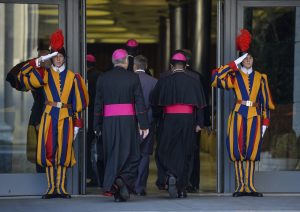by ROWENA OREJANA
The “arrogant and paternalistic form of jargon” used in the questionnaire for this year’s Synod on the Family seemed to turn off New Zealand Catholics.

Bishops arrive at the Synod on the Families, in the Synod Aula, at the Vatican, on October 6, 2014. The Pontiff on Sunday launched a major review of Catholic teaching on the family that could lead to change in the Church’s attitude to marriage, cohabitation and divorce. An extraordinary synod, or meeting, of nearly 200 bishops from around the world and a sprinkling of lay people will, for the next two weeks, address the huge gulf between what the Church currently says on these issues and what tens of millions of believers actually do. AFP PHOTO / ANDREAS SOLARO (Photo credit should read ANDREAS SOLARO/AFP/Getty Images)
Wellington Cardinal John Dew, who spoke at the Auckland Priests Assembly at Waipuna Lodge on August 20, said the
number of responses dropped to one-fifth of the number who responded to the 2014 survey.
The New Zealand bishops received only 500 responses to the questionnaire sent out early this year, compared with
2500 responses received last year.
“People found the language of the questions arrogant and [a] paternalistic form of jargon and [it] was unintelligible to many,” Cardinal Dew said, adding: “The questions were seen to exclude the ordinary person.”
Cardinal Dew said some respondents also thought the document that came out of last year’s synod did not address
family issues that affect New Zealanders.
Those issues include the fact that 80 per cent of marriages are between Catholics and non-Catholics (a predominant
situation in New Zealand), middle-aged children caring for their elderly parents and their children, single-parent families, particularly mothers who choose not to abort their children, the role of women in the Church, the role of widows and widowers in the Church, migrants who do not have extended families, as well as the importance of extended families to Maori and Pacific people.
“Just so that you are aware of what our people are saying: The term ‘wounded family’ is experienced by a number
of people, the very people that we are trying to reach. It is deeply insulting and demeaning to them to call them
‘wounded family’,” he said.
He said it would be better to talk about them as “people whose lives don’t conform to Catholic teachings”, as that is seen as a more neutral statement.
Cardinal Dew said in the first survey, 25 per cent of the responses came from non-practising Catholics, a fact that got the attention of a lot of people in the synod hall.
“This year, we didn’t get that many because of the language that was used,” he said.
Cardinal Dew clarified that last year’s synod was not about changing the Church’s teachings.
“In actual fact, the full title of the synod last year was the Pastoral Challenges of the Family in the Context
of Evangelisation. And that was what people were looking at,” he said.
“Pastoral challenges and evangelisation are what our lives are about. Meeting the pastoral challenges we see, being
alongside families, walking with families, accompanying families as they face various challenges and you know that
they do, it’s what our lives as priests are all about,” he said.
Cardinal Dew said he believes this will continue to be the focus of the coming synod.
“In all of the things that were brought up, there was actually no suggestions that doctrines would be changed,” he
said. “It was always about what do we do to care for people in their most difficult or exceptional situations.”
Cardinal Dew said there are people in our Church who are still hurting.
“They do not see it safe to engage in the Church. They fear being hurt and being judged by our teaching. Many
have moved away from the institutional Church for fear of being hurt, or having been hurt by their experiences of a
judgmental Church,” he said.
Reader Interactions